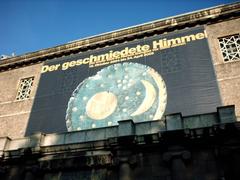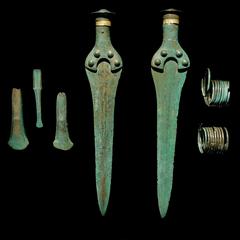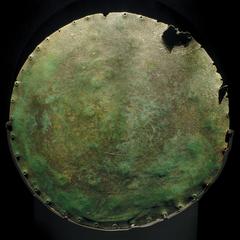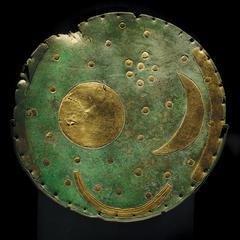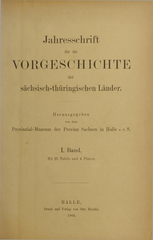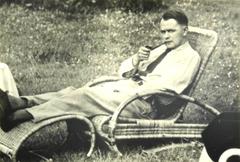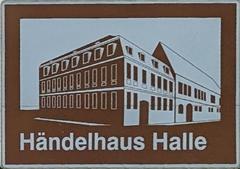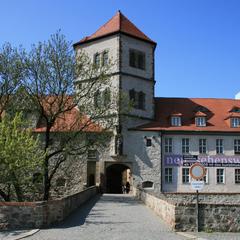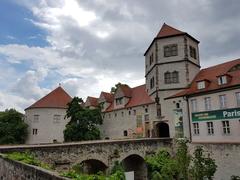
Halle State Museum of Prehistory: Visiting Hours, Tickets, and Historical Sites in Halle, Germany
Date: 14/06/2025
Introduction
The Halle State Museum of Prehistory (Landesmuseum für Vorgeschichte Halle) is a renowned archaeological institution and a cornerstone of European cultural heritage. Established in 1819, it stands among the oldest and most comprehensive prehistoric museums in Europe, boasting a collection of over 15 million artifacts. These artifacts chronicle human history from the Paleolithic era through the Iron Age, with particular emphasis on the region of Saxony-Anhalt. The museum’s most famous exhibit is the Nebra Sky Disc, a Bronze Age artifact recognized as the oldest concrete depiction of the cosmos and listed on UNESCO’s Memory of the World Register.
Housed in a neoclassical-modernist building designed by Wilhelm Kreis and opened in 1918, the museum has undergone significant modernization to provide accessible, interactive, and educational experiences for visitors. Its central location in Halle (Saale) makes it an ideal starting point for exploring other local historical attractions, such as Moritzburg Castle and the Francke Foundations.
Whether you are an archaeology enthusiast, a history buff, or a family seeking an educational adventure, this comprehensive guide covers everything you need to know—visiting hours, tickets, exhibitions, accessibility, and travel tips—to make the most of your visit to the Halle State Museum of Prehistory and the surrounding historical sites (official museum website, try-travel.com).
Table of Contents
- History and Significance
- Architectural Evolution
- Collections and Key Artifacts
- Research and Education
- Visitor Information: Tickets, Hours, and Accessibility
- Special and Permanent Exhibitions
- Upcoming Renovations and Events
- Travel Tips and Nearby Attractions
- Frequently Asked Questions (FAQ)
- Conclusion and Recommendations
- References
History and Significance
Founded in 1819, the Halle State Museum of Prehistory was established during a wave of Enlightenment-era interest in human origins and archaeology. Its collections have grown through local discoveries, state-sponsored excavations, and private donations. The museum serves as both a repository for the region’s archaeological heritage and a center for international research, making significant contributions to our understanding of prehistoric Europe (Landesmuseum Vorgeschichte).
Architectural Evolution
Initially housed in smaller venues, the museum moved to its present building in 1918. The structure, influenced by the Roman Porta Nigra, combines neoclassical grandeur with modernist functionality. Extensive renovations in the 21st century have introduced advanced conservation labs, interactive galleries, and improved accessibility, ensuring a welcoming experience for all visitors (verliebtinhalle.de).
Collections and Key Artifacts
The Nebra Sky Disc
The Nebra Sky Disc, discovered in 1999 and acquired by the museum in 2002, is the institution’s most celebrated artifact. Dating to around 1600 BCE, this bronze disc inlaid with gold represents the oldest known concrete depiction of celestial phenomena, including the sun, moon, and Pleiades. It is displayed in a dedicated gallery, accompanied by interpretive materials and scientific research (The Collector, Landesmuseum Vorgeschichte).
Other Highlighted Exhibits
- Burials of Eula: An innovative exhibit featuring upright skeletons, revealing burial customs and early community structures.
- Stone Age and Ice Age Artifacts: Including a mammoth skeleton and ivory carvings.
- Bronze and Iron Age Treasures: Wealthy burials from Leubingen and Profen, bronze jewelry, and ceremonial artifacts.
- Roman Period Finds: Evidence of trade and contact, even though the region lacked Roman settlements.
- Human Fossils: Rare specimens such as a 370,000-year-old Homo erectus skeleton and an 80,000-year-old Neanderthal fingerprint (European Traveler, mainlymuseums.com).
Research and Education
The museum is at the forefront of archaeological research, collaborating with universities and heritage organizations across Europe. Its scientific staff undertake large-scale excavations and publish findings in respected journals. Educational initiatives include guided tours (in German and English), workshops, family programs, and interactive displays designed to engage visitors of all ages (ne-mo.org).
Visitor Information: Tickets, Hours, and Accessibility
- Address: Richard-Wagner-Straße 9, 06114 Halle (Saale)
- Opening Hours: Tuesday to Friday, 9:00 AM – 5:00 PM; weekends and public holidays, 10:00 AM – 6:00 PM; closed December 24 and 31 (verliebtinhalle.de).
- Tickets: Adults €8, concessions €6. Discounts available for students, families, and groups. Children under 18 often enter free. The Halle Card offers access to twelve museums, public transport, and a guided tour (mainlymuseums.com).
- Accessibility: The museum is fully wheelchair accessible, with ramps, elevators, and adapted restrooms. Staff can assist visitors with special needs.
- Facilities: Museum shop, café, cloakrooms, lockers, and rest areas for visitor comfort.
Special and Permanent Exhibitions
Permanent Collection
The museum’s permanent exhibition is arranged chronologically, guiding visitors from the Paleolithic era to the early modern period. Thematic galleries feature immersive displays—such as reconstructed dwellings, multimedia installations, and tactile learning stations—that make prehistory accessible and engaging for all ages.
Upcoming Special Exhibitions (2025–2026)
- “Monasteries. Plundered. In the Turmoil of the Peasant Uprisings” (from June 28, 2025): Commemorates the 500th anniversary of the German Peasants’ War, featuring artifacts from sites like Himmelpforte Monastery.
- “The Shamaness” (March 27 – November 1, 2026): Explores early spiritual practices through the Mesolithic “Shamaness of Bad Dürrenberg” burial and related artifacts (museum special exhibitions).
Upcoming Renovations and Gallery Updates
As of June 2025, the “Passion for Bronze” gallery is closed for renovation and will reopen in autumn 2025. The famous Nebra Sky Disc remains on display in another gallery during these works. Renovations aim to improve exhibit design, accessibility, and the integration of new research findings.
Travel Tips and Nearby Attractions
- Getting There: The museum is centrally located and accessible by tram lines 2 or 7 from Halle Central Station. Parking is available nearby, but public transport is recommended during peak periods.
- Nearby Attractions: Moritzburg Castle, Market Square, Francke Foundations, and the Halloren Chocolate Factory are all within easy reach and provide a broader cultural context for your visit (thecrazytourist.com).
- Virtual Visit: The museum offers a virtual tour on its website for those wishing to explore key exhibits remotely.
Frequently Asked Questions (FAQ)
Q: What are the museum’s opening hours?
A: Tuesday to Friday, 9:00 AM – 5:00 PM; weekends and public holidays, 10:00 AM – 6:00 PM; closed December 24 and 31.
Q: How can I purchase tickets?
A: Buy tickets online via the official museum ticket page or at the museum entrance.
Q: Is the museum accessible for wheelchair users and visitors with disabilities?
A: Yes, the museum offers full accessibility and staff assistance.
Q: Are guided tours available in English?
A: Yes, guided tours in English can be arranged in advance.
Q: Can I take photographs in the museum?
A: Non-flash photography is permitted in most areas, with some restrictions for special exhibitions or specific artifacts.
Q: What is the Halle Card and what does it include?
A: The Halle Card grants access to multiple museums, public transport, and a guided city tour.
Conclusion and Recommendations
The Halle State Museum of Prehistory offers an unparalleled exploration of Europe’s ancient past. Its world-class collections—including the Nebra Sky Disc—innovative exhibits, and commitment to research and education make it a must-visit destination in Halle. The museum’s modern amenities, accessibility features, and proximity to other cultural landmarks ensure an enjoyable and enriching experience for all.
To maximize your visit:
- Review current visiting hours and ticket details on the official museum website.
- Consider guided tours or audio guides for a deeper understanding.
- Explore nearby historical sites for a comprehensive cultural experience.
- Stay updated on special exhibitions and renovations.
For the most up-to-date information, ticketing, and virtual resources, consult the museum’s official website. Engage further by following the museum on social media and downloading the Audiala app for multilingual audio guides.
References and Further Information
- Halle State Museum of Prehistory: Visiting Hours, Tickets, and Exploring Halle’s Historical Sites, 2025, Try-Travel (try-travel.com)
- Halle State Museum of Prehistory: Visiting Hours, Tickets, and the Nebra Sky Disc Explained, 2025, European Traveler (european-traveler.com)
- Halle State Museum of Prehistory Visiting Hours, Tickets, and Visitor Guide, 2025, Verliebt in Halle (verliebtinhalle.de)
- Halle State Museum of Prehistory: Visiting Hours, Tickets, Exhibitions & Nearby Historical Sites, 2025, Landesmuseum für Vorgeschichte (landesmuseum-vorgeschichte.de)

